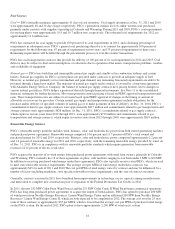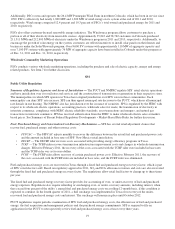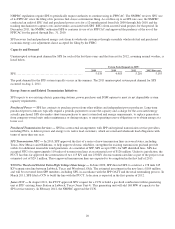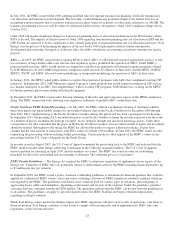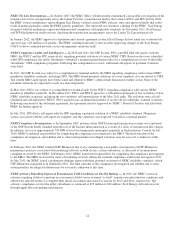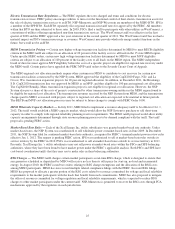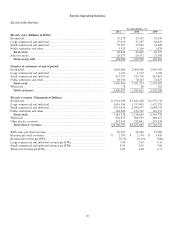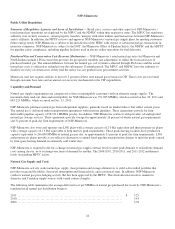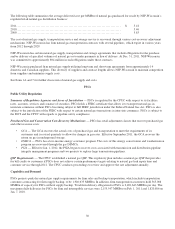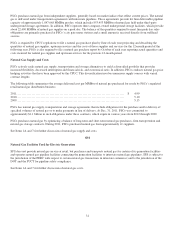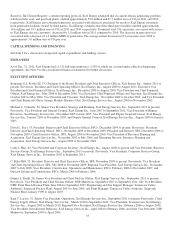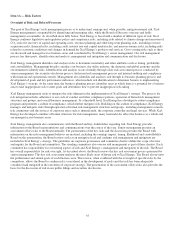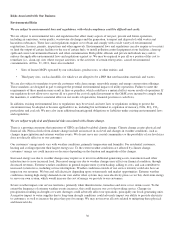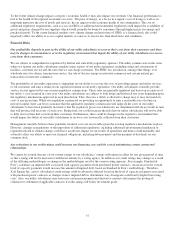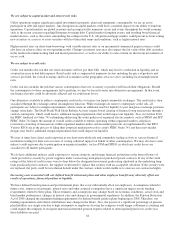Xcel Energy 2011 Annual Report Download - page 38
Download and view the complete annual report
Please find page 38 of the 2011 Xcel Energy annual report below. You can navigate through the pages in the report by either clicking on the pages listed below, or by using the keyword search tool below to find specific information within the annual report.28
NSP-Minnesota
Public Utility Regulation
Summary of Regulatory Agencies and Areas of Jurisdiction — Retail rates, services and other aspects of NSP-Minnesota’s
retail natural gas operations are regulated by the MPUC and the NDPSC within their respective states. The MPUC has regulatory
authority over security issuances, certain property transfers, mergers with other utilities and transactions between NSP-Minnesota
and its affiliates. In addition, the MPUC reviews and approves NSP-Minnesota’s natural gas supply plans for meeting customers’
future energy needs. NSP-Minnesota is subject to the jurisdiction of the FERC with respect to certain natural gas transactions in
interstate commerce. NSP-Minnesota is subject to the DOT, the Minnesota Office of Pipeline Safety, the NDPSC and the SDPUC
for pipeline safety compliance, including pipeline facilities used in electric utility operations for fuel deliveries.
Purchased Gas and Conservation Cost-Recovery Mechanisms — NSP-Minnesota’s retail natural gas rates for Minnesota and
North Dakota include a PGA clause that provides for prospective monthly rate adjustments to reflect the forecasted cost of
purchased natural gas. The annual difference between the natural gas cost revenues collected through PGA rates and the actual
natural gas costs is collected or refunded over the subsequent 12-month period. The MPUC and NDPSC have the authority to
disallow recovery of certain costs if they find the utility was not prudent in its procurement activities.
Minnesota state law requires utilities to invest 0.5 percent of their state natural gas revenues in CIP. These costs are recovered
through customer base rates and an annual cost-recovery mechanism for the CIP expenditures.
Capability and Demand
Natural gas supply requirements are categorized as firm or interruptible (customers with an alternate energy supply). The
maximum daily send-out (firm and interruptible) for NSP-Minnesota was 751,985 MMBtu, which occurred on Jan. 20, 2011 and
689,223 MMBtu, which occurred on Dec. 13, 2010.
NSP-Minnesota purchases natural gas from independent suppliers, generally based on market indices that reflect current prices.
The natural gas is delivered under transportation agreements with interstate pipelines. These agreements provide for firm
deliverable pipeline capacity of 587,811 MMBtu per day. In addition, NSP-Minnesota contracts with providers of underground
natural gas storage services. These agreements provide storage for approximately 26 percent of winter natural gas requirements
and 32 percent of peak day firm requirements of NSP-Minnesota.
NSP-Minnesota also owns and operates one LNG plant with a storage capacity of 2.0 Bcf equivalent and three propane-air plants
with a storage capacity of 1.3 Bcf equivalent to help meet its peak requirements. These peak-shaving facilities have production
capacity equivalent to 246,000 MMBtu of natural gas per day, or approximately 31 percent of peak day firm requirements. LNG
and propane-air plants provide a cost-effective alternative to annual fixed pipeline transportation charges to meet the peaks caused
by firm space heating demand on extremely cold winter days.
NSP-Minnesota is required to file for a change in natural gas supply contract levels to meet peak demand, to redistribute demand
costs among classes, or to exchange one form of demand for another. The 2009-2010, 2010-2011, and 2011-2012 entitlement
levels are pending MPUC action.
Natural Gas Supply and Costs
NSP-Minnesota actively seeks natural gas supply, transportation and storage alternatives to yield a diversified portfolio that
provides increased flexibility, decreased interruption and financial risk, and economical rates. In addition, NSP-Minnesota
conducts natural gas price hedging activity that has been approved by the MPUC. This diversification involves numerous
domestic and Canadian supply sources with varied contract lengths.
The following table summarizes the average delivered cost per MMBtu of natural gas purchased for resale by NSP-Minnesota’s
regulated retail natural gas distribution business:
2011................................................................
...................
$
5.25
2010................................................................
...................
5.43
2009................................................................
...................
5.78


